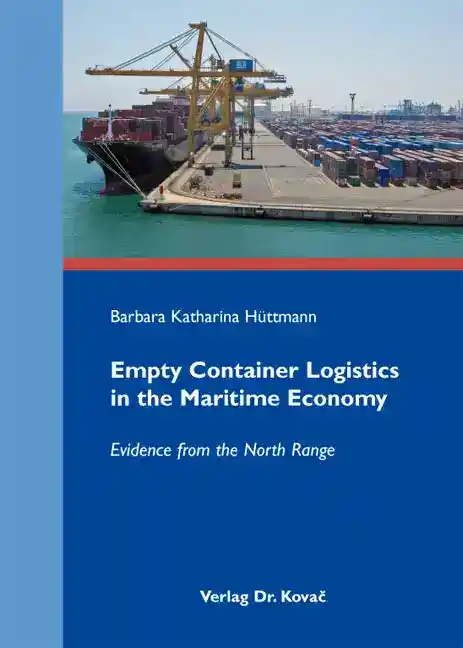Barbara Katharina HüttmannEmpty Container Logistics in the Maritime Economy
Evidence from the North Range
- in englischer Sprache -
Schriftenreihe volkswirtschaftliche Forschungsergebnisse, volume 188
Hamburg 2013, 410 pages
ISBN 978-3-8300-6477-0 (print)
ISBN 978-3-339-06477-6 (eBook)
About this book deutschenglish
Container shipping represented one of the most dynamic segments of the world economy over the past decades. Nevertheless, nearly every fifth container is handled empty in global seaports at present. This implies considerable extra costs for all stakeholders in the container logistics chain, but also an additional burden for transport systems and the environment. Empty container movements are thus considered to be the “Achilles heel” of the container industry. In consequence, an efficient empty container logistics is of major importance for all stakeholders involved.
The present work provides a detailed economic analysis of the major problems and challenges related to empty container transportation in the maritime economy on a global, regional and local scale. It is the first study that comprehensively deals with the problem with a particular focus on the North Range port region.
As means of a basis for further considerations, the various stakeholder groups of empty container logistics and the root causes of empty container transportation are presented. In the analysis of empty container logistics at a global level, various strategies to address imbalances in trade flows and to optimise empty container transportation are discussed. Based on several expert interviews conducted, the author evaluates the strategies according to their particular strengths and weaknesses, but also to their relevance for practical application. Furthermore the main barriers to the implementation of several strategies are identified.
The organisation and structure of empty container logistics at a regional and local scale are analysed and compared with a focus on the major four container ports located in the European North Range: Antwerp, Bremerhaven, Hamburg and Rotterdam. The analysis reveals that the seaports are forced to further address empty container logistics at port and regional level and to implement innovative approaches in the long run. Based on these findings, the author formulates the key elements of a potential local and regional empty container logistics strategy for the North Range.
The empirical part of the study examines the determinants of empty container transportation at a macro level. In order to investigate the factors affecting seaborne empty container flows to German North Range ports, an augmented gravity model is developed in a panel data framework for the first time. It augments the ‘classical’ gravity approach by further potential determinants of empty container transportation, such as different forms of trade imbalances. By this means, empirical evidence on the determinants of empty container flows at the macro level can first be provided. Furthermore, the findings validate the relevance of trade imbalances as key determinants of empty container movements.
